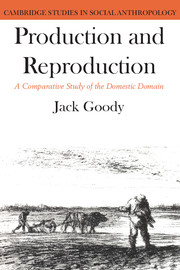Book contents
- Frontmatter
- Contents
- Tables
- Figures
- Preface
- Acknowledgements
- 1 The evolution of the domestic economy: the hoe and the plough
- 2 The theory, the variables and a test
- 3 Making causal inferences
- 4 Farming, labour and sex
- 5 Concubines and co-wives: the structure of roles in Africa and Eurasia
- 6 Adoption in cross-cultural perspective
- 7 Strategies of heirship
- 8 Class and marriage
- 9 Retrospect
- Appendix 1 Tables
- Appendix 2 The probability of family distributions
- Notes
- References
- Index
- Frontmatter
- Contents
- Tables
- Figures
- Preface
- Acknowledgements
- 1 The evolution of the domestic economy: the hoe and the plough
- 2 The theory, the variables and a test
- 3 Making causal inferences
- 4 Farming, labour and sex
- 5 Concubines and co-wives: the structure of roles in Africa and Eurasia
- 6 Adoption in cross-cultural perspective
- 7 Strategies of heirship
- 8 Class and marriage
- 9 Retrospect
- Appendix 1 Tables
- Appendix 2 The probability of family distributions
- Notes
- References
- Index
Summary
When I first took a berth on boat to West Africa, I did not do so with the sole purpose of getting to know something about an African society or, more generally, the ‘savage mind.’ I was certainly very involved with the problems of getting to know another culture, another way of looking at the world. But other concerns were present too. What I knew of the medieval literature and history of Europe whetted my appetite to learn more about pre-industrial societies, their beliefs as well as their economic and productive systems. A period in the eastern Mediterranean had extended these interests in time and in space.
Secondly, there was the immediate situation in which I found myself in West Africa. Events were moving fast in Ghana during the period I was first there and the Convention People's Party, to the Birifu branch of which I was inscribed, were well on their way to power. However it was not only the links between local ‘tribe’ and national politics that concerned me, but the earlier links, with long distance trade, with Islam, with neighbouring states. It was on these historical subjects that I wrote when I first returned, and it was these subjects, in a wider context, that I pursued when trying to ask what it was that writers meant when they used terms like feudal to describe African states.
- Type
- Chapter
- Information
- Production and ReproductionA Comparative Study of the Domestic Domain, pp. ix - xPublisher: Cambridge University PressPrint publication year: 1977

